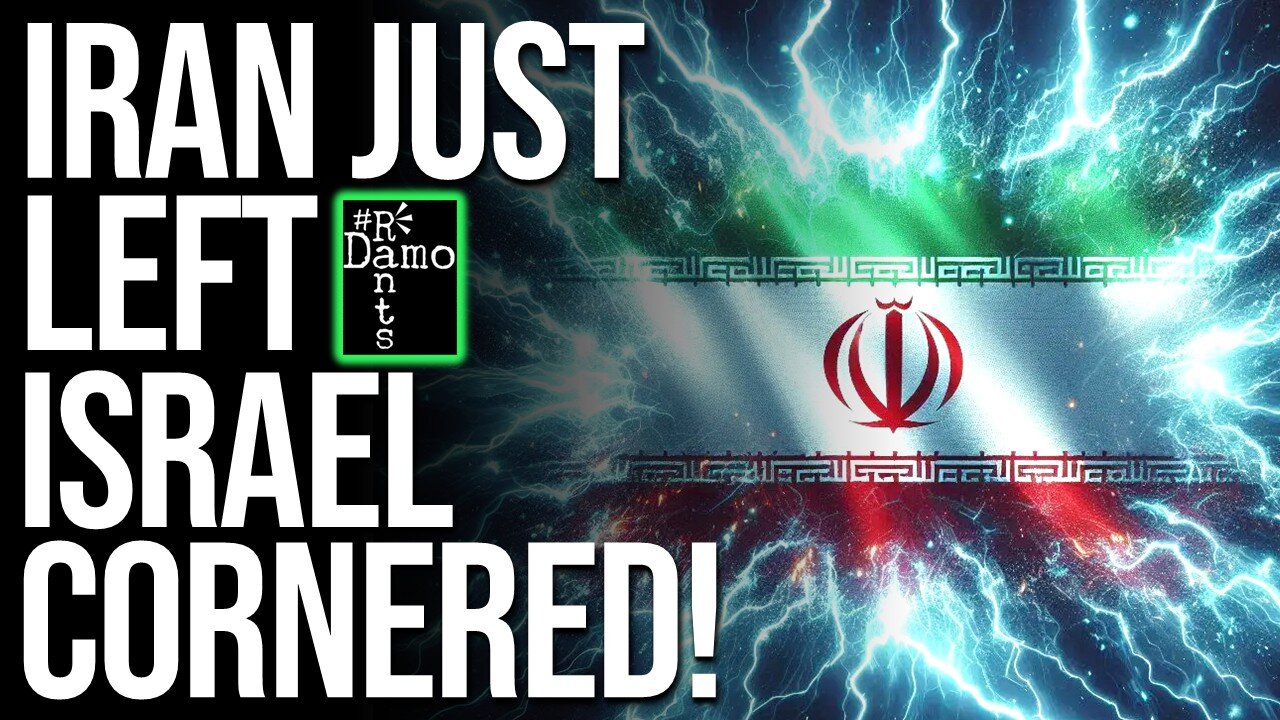Premium Only Content

Netanyahu Drove Into Gaza — But Iran’s Now Blocking Every Exit
Right, so In Washington, the green light came not with a flourish of diplomacy, but with a wink. Donald Trump’s quiet assent to Israel’s Gaza City takeover was the kind of presidential blessing that travels faster than any press release — understood in Tel Aviv as a licence to proceed, and in much of the world as proof that the United States has chosen sides with eyes wide open. No grand speeches about human rights, no pretence of mediation; just the silent approval that make all atrocities possible. Tehran, meanwhile, is doing something Western capitals will find far harder to spin away. Iran has dragged the Organisation of Islamic Cooperation into an emergency session, warning that the takeover is a fast-track to a “humanitarian catastrophe” and demanding collective action, or it’ll be them next. One power is oiling the wheels of occupation in the shadows; the other is sounding the alarm in broad daylight. And for as much as Iran are permanently positioned as the baddies, good luck to the media in spinning that line after this.
Right, so what’s happening in Gaza right now isn’t just another chapter in an already too long and bloody story — it’s a collision of forces all coming together now. Israel has signed off on another genocidal move, this time to seize Gaza City as a first step to complete control of the Gaza Strip, a military gamble that even some of its own top security officials say can’t be won. Over in Washington, Donald Trump has quietly given his personal nod — not written into any official policy, but still carrying all the weight of US backing. Yet at the same time and in polar opposite to all of that, Iran is stepping into the spotlight once again, calling an emergency meeting of the Organisation of Islamic Cooperation (OIC) to rally opposition to this. But the OIC itself is split, and those divisions will decide whether this becomes real action or just more talk. And through it all, Western media are finding it harder than ever to keep control of the story, because the roles of “pariah” and “partner” have been flipped in a way they’d rather not admit. The result is a moment in which the military, political, humanitarian, legal, and informational strands of the Gaza war are all at once exposed, offering a rare chance to see the underlying narratives and actions of the conflict and the global order sustaining it.
The Washington Post has reported that the Israeli security cabinet has formally approved a plan to seize and secure Gaza City, a move that Benjamin Netanyahu has framed as essential to dismantling Hamas and reasserting Israeli control over the security environment in the Strip, same story different day isn’t it? The plan, according to this reporting and corroborated by others, involves a two-phase operation: first, the evacuation of civilians from the city; then, a sustained ground incursion to target Hamas infrastructure, what counts as what you have to take Israel’s word for though and we know what that looks like by now. Netanyahu has insisted this does not signal a permanent occupation, but that claim is rather difficult to reconcile with the mechanics of the plan, which require maintaining control over a city of hundreds of thousands in a territory already under siege, with the plans to move into other areas until the Strip is entirely under Israeli control the next phase. International humanitarian law is explicit on the prohibition of forcible transfer of civilians in occupied territory, except for their own safety in temporary circumstances. The pattern in Gaza has been anything but that: previous “temporary” evacuations have become long-term displacements, with Palestinians unable to return to their homes for years, if ever as Israel systematically level entire blocks. In that sense, the Gaza City operation, even before it begins, is freighted with legal and moral questions that reach far beyond military tactics.
What makes this decision all the more significant is that some of the strongest critiques come not from Israel’s adversaries, but from within its own security establishment. Press TV has quoted Ami Ayalon, former head of Shin Bet and once commander of the Israeli navy, warning in stark terms that “Israel is fighting a war it cannot win.” Ayalon’s critique is grounded in decades of experience, not only in intelligence but in the political aftermath of security operations. He understands that Hamas is not simply a military formation that can be destroyed with sufficient firepower; it is also a political movement with deep roots in Palestinian society, bolstered, paradoxically, by the very siege and bombardment that Israel has employed to weaken it. One minute Hamas had been destroyed, the next they’ve rebuilt their numbers entirely. Eyal Zamir, the current IDF Chief of Staff, has also raised operational objections, as reported by the Financial Times. Zamir has cautioned Netanyahu that occupying Gaza City will likely imperil the lives of remaining hostages, draw the army into protracted and costly urban combat, and stretch the IDF’s resources at a time when the northern border with Hezbollah remains volatile. Other reports have captured the strategic risk of such an operation in the analysis of the likely shift from conventional battle to entrenched guerrilla warfare, noting that Gaza’s dense urban terrain and tunnel networks effectively neutralise much of Israel’s technological advantage.
From Hamas’s perspective, the Israeli plan is both a provocation and an opportunity. In a statement reported by Press TV, the movement condemned the occupation plan as “an escalation doomed to fail” and vowed to resist until “the last soldier leaves our land.” Hamas is likely to use tactics honed over years of asymmetric conflict: ambushes in narrow streets, improvised explosive devices, and the extensive tunnel system that allows fighters to appear and disappear in moments. Such resistance is not only militarily costly for Israel, it is also politically potent for Hamas, which can portray survival of itself as victory in the face of overwhelming force.
The humanitarian implications of the operation are already coming into focus. El País has carried recent testimony from Gaza’s medical personnel warning that the territory’s health system, already crippled by blockade and bombardment, cannot withstand another wave of mass displacement and injury. “The last thing we need is a new mass displacement,” one doctor said, underscoring the impossibility of absorbing additional casualties when hospitals lack electricity, fuel, and the most basic supplies now. The United Nations has warned that famine conditions are already present in parts of Gaza, and that further disruption of food and water access could tip the entire population into acute crisis. Well what are you going to do about that then? Keep sitting on your hands?
Into this volatile mix comes the role of the United States. The bloviating orange corpuscle that is Donald Trump has privately given what aides describe as a “green light” to the Gaza City operation. In foreign policy practice, the president’s assent is the assent of the United States. Allies and adversaries alike understand that a nod from the White House, even behind closed doors, constitutes a policy position. In this case, that position aligns Washington with a military action condemned by the UN and warned against by Israel’s own generals. This is not without consequence either. Time Magazine has reported that Germany, a key Western ally, has suspended arms sales to Israel linked to the Gaza war, citing concerns about international law. About flaming time a lot of you might be thinking, but it is the plan to completely occupy the Gaza Strip that has tipped them, at this point anyway, for how long who knows? This divergence within the Western alliance undermines the narrative unity that Washington prefers to project, that what they do, the rest of the West supports, especially when attempting to frame Israel’s actions as part of a broader “war on terror” rather than a campaign of occupation.
So its against this backdrop, that Iran has now acted with deliberate timing and purpose. As again reported by Press TV, Iranian Foreign Minister Abbas Araghchi has called for an emergency meeting of the OIC to address what he terms a “humanitarian catastrophe” in Gaza, explicitly linking Israel’s actions to breaches of international law. The OIC, with its 57 member states, is the largest intergovernmental organisation after the United Nations, and its resolutions—while non-binding—carry significant political weight in the Muslim world and the broader Global South. By initiating this meeting, Iran is positioning itself as the most vocal state champion of the Palestinian cause at a time when many Arab governments remain publicly muted on it or worse, complicit. It also forces those governments to take a position, either aligning with the humanitarian language of the resolution or exposing their unwillingness to confront Israel and, by extension, the United States.
The OIC’s internal divisions, however, are deep. States such as Saudi Arabia, the UAE, Egypt, Morocco, Jordan, and Bahrain have either formalised ties with Israel through the Abraham Accords or maintain close security relationships with Washington. These governments are likely to resist any Iranian attempt to include enforceable measures in the resolution, such as sanctions, boycotts, or the referral of Israeli officials to international courts. Their strategy will be to dilute the text, emphasising humanitarian concern while avoiding language that could commit them to specific actions. Yet the political cost of openly opposing a condemnation of Israel’s actions is steep, given the strength of pro-Palestinian sentiment among their populations. Trump’s ambiguous green light, absent a formal US declaration, offers them room to manoeuvre: they can support a watered-down resolution and present it domestically as solidarity with Palestine, while assuring Washington that nothing in the text obliges them to confront Israel directly.
If the OIC meeting fails to produce meaningful action, Iran has several options to preserve and even enhance its own position though. It can consolidate a smaller bloc within the OIC that are willing to adopt stronger measures, states like Yemen, Malaysia, Indonesia and Pakistan and present this coalition as the authentic voice of the Muslim world. It can escalate its support for the Axis of Resistance, encouraging Hezbollah, the Houthis, and Iraqi militias to increase pressure on Israel through targeted military actions. It can also engage in high-visibility humanitarian diplomacy, organising aid convoys or flotillas to Gaza, some of which are already planned for later this month of course that would compel Israel either to allow entry—ceding a propaganda victory—or to block them, creating a public relations crisis. They could also try the UN, but good luck with that frankly.
For Western media, so pro Israel as so many of them are, this moment presents something of a challenge though. Outlets such as the Washington Post, Reuters, and the Financial Times have reported extensively on the risks of the Gaza operation, including dissent within Israel’s security establishment. Yet these same outlets operate within a framework that resists casting US policy as complicit in war crimes. Their coverage of Iran’s OIC initiative, if they cover it at all and right now, none are, is likely to emphasise Tehran’s bogeyman style ambitions, highlight divisions within the OIC, which are legitimate to a point and recall Iran’s own human rights record as something of a gotcha even if its not relevant to the current discussion, thereby diluting the moral clarity of its humanitarian appeal, at least to those audiences of it. In the Global South, by contrast, the framing will be more direct: Iran as the state willing to act where the West enables atrocity; the OIC as a test of the Muslim world’s credibility; and the United States as increasingly isolated alongside Israel. This framing is not merely academic. In this era of instant global communication, such narrative splits deepen mistrust in Western media and fuel alternative information sources, independent and alternative media, as well as access to foreign media and when you’ve done that for a while you realise how poor Western journalistic standards in the mainstream really are.
The United Nations, for its part, remains paralysed, hence my belief Iran is wasting its time if it goes to them. The Security Council is hobbled by the certainty of a US veto on any resolution targeting Israel. The General Assembly can pass resolutions by overwhelming margins, but these are non-binding and carry no enforcement mechanism, save for the Uniting for Peace option, which there still seems to be no appetite to take. Peacekeeping forces cannot be deployed without the consent of the parties, which Israel will never grant for Gaza. Even when UN commissions of inquiry conclude that Israel has committed grave breaches of international law, these findings are relegated to reports that gather dust in New York and Geneva. The UN’s inability to act decisively reinforces the argument, advanced by Iran and others, that alternative forums such as the OIC must fill the vacuum.
The moral and strategic case for a ceasefire has never been stronger. Militarily, the operation is unlikely to achieve its stated goal of dismantling Hamas; politically, it risks deepening Israel’s isolation and strengthening the very forces it seeks to weaken; humanitarily, it will accelerate a crisis that already verges on famine and epidemic. Trump’s personal endorsement binds the United States to this course, but it also risks alienating allies, galvanising opposition across the Global South, and eroding Washington’s ability to shape the postwar order. Iran’s initiative, whether or not it yields a strong OIC resolution, has already shifted the diplomatic terrain, forcing the Palestinian question back to the centre of the Muslim world’s agenda.
If the Gaza City operation proceeds, it will not only devastate the immediate humanitarian situation but also crystallise the moral bankruptcy of the current international order, in which the most powerful states can green-light atrocities without fear of consequence, and the institutions charged with upholding the law are reduced to issuing statements of concern.
Of course one course of action outside of this particular debate that can still hurt Israel in sufficient amounts is the matter of BDS, boycott, divestment and sanctions and one state leading the charge on that more than most is Slovenia of all places, having already implemented a full arms embargo on Israel, the first European nation to do so, they’ve now followed that up with another blow to the genocidal apartheid state and its trade. Get all the details of that story in this video recommendation here as your suggested next watch.
Please do also hit like, share and subscribe if you haven’t done so already so as to ensure you don’t miss out on all new daily content as well as spreading the word and helping to support the channel at the same time which is very much appreciated, holding power to account for ordinary working class people and I will hopefully catch you on the next vid. Cheers folks.
-
 26:01
26:01
Lady Decade
18 hours agoIs the Atari Jaguar worth playing in 2025 !?
11.8K7 -
 11:08
11:08
ThinkStory
12 hours agoWELCOME TO DERRY Episode 1 Biggest Theories & Hidden Details
13K2 -
 4:33
4:33
Buddy Brown
18 hours ago $0.01 earnedWatch EBT Users Threaten to Come to Our Homes & STEAL FOOD on Thanksgiving! | Buddy Brown
12.1K21 -
 2:07:03
2:07:03
BEK TV
1 day agoTrent Loos in the Morning - 10/29/2025
10.5K1 -
 15:09
15:09
BlackDiamondGunsandGear
11 hours agoTop 5 Pistols UNDER $400
56.5K18 -
 5:58:29
5:58:29
Flex011
7 hours agoCan We All Survive the Night? 😱 | UNTIL DAWN Horror Adventure LIVE!
10.8K1 -
 8:31
8:31
Hollywood Exposed
15 hours agoJoe Rogan Just EXPOSED Who’s REALLY Behind the “No Kings” Protests
18K5 -
 34:29
34:29
Uncommon Sense In Current Times
18 hours ago $0.01 earnedFaith at Work | Mike Sharrow on Living Boldly for Christ in Business
15.6K -
 1:50:34
1:50:34
Midnight In The Mountains™
3 hours ago☕ Morning Coffee w/ Midnight & The Early Birds of Rumble | 3i/ATLAST?! Caribbean Screwed
9.75K3 -
 LIVE
LIVE
DynastyXL
3 hours agoTriple Threat Challenge | Fortnite | PUBG | WZ |
20 watching